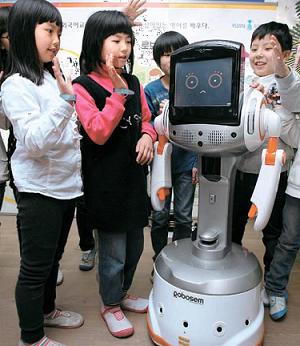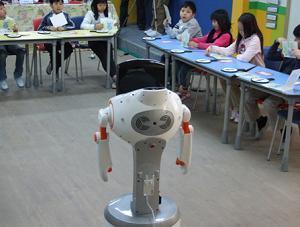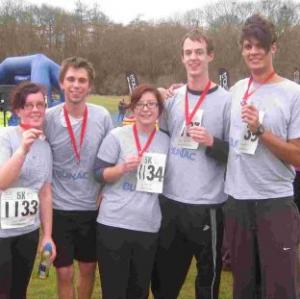The following are IELTS test questions collected from the Internet. Here are some examples of my student's essays to them. Hope they get you started on your own essays.
Happy writing!
Teacher Charlie
Writing task 2 (an essay) Some people think robots can improve humans’ life in the future, while others think robots may affect society in a bad way. Discuss both views and give your opinion.
Student's examples:
Robots: Good or not?
Robots have been around a long time in science fiction but only recently have they made their way into mainstream society. Many feel robotics is beneficial to industry but others feel potential evils to mankind.
Benefits would include work force cost reduction including such things as salaries, health benefits, pensions, bonuses, etc. Robots have proven themselves as useful tools in factory automation speeding up and increasing the overall quality of manufactured goods such as automobiles. Robots can work 24/7 and require no sick days or holidays.
However, the bad things are high development cost, the necessity for complex and sophisticated control systems, loss of skilled workers in the areas the robots replace and the need for the hiring of outside expertise.
Single facilities such as the new Heninken brewery in Spain can have a cost of 1.2 billion baht. This amount of investment precludes smaller, entrepreneurial endeavors from competing in these sectors making use of robotic technology. Only huge multi-national corporations will be able to compete in high volume efforts such as packaging and manufacturing.
In conclusion, if corporations use the cost savings of robotic technology and pass on the unit cost savings to the consumer, automation might be viewed as beneficial to humanity. However, corporations being corporations, with the stated purpose of making profit, the likely hood of this happening in my opinion is very small. I therefore view robotics as being bad overall.
Essay example concerning an invitation to dinner.
Student's examples:
Dear John,
Thank you so much for your invitation to dinner. Glad to hear you are coming back to Bangkok so soon.
I am pretty busy at work the week you return so I would like to suggest we meet Friday evening after work finished for me. I know you like seafood like me and would like to suggest a new friend’s restaurant on Soi Asok. It is called ‘Charlie’s Seafood Palace’ and is near Soi Asok BTS and MRT stations.
I should be finished with work around 7PM and would love to hook up with you at 8 at Charlie’s. It is across from the XYZ Hotel on Asok and easy to find. I will be brining my wife Montana with me and hope you have a friend as well. Maybe dancing afterwards?
Great to hear you’re back in the City of Angels again. See you Friday!
Writing task 1 (a letter)
You have purchased a new electronic item last week, but it has arrived damaged. Write a letter to the shop manager to complain about this. In your letter explain
- What was the product?
- What was the fault?
- What do you ask the manager to do?
Student's examples:
I know you are busy but I would like to ask you to help me.
Last week I ordered your HP Laser Printer over the Internet and it arrived damaged. The box was crushed on one corner and when I opened it, the printer was cracked.
I would like to return the product to you for an undamaged unit. What procedure do I need to follow to send it back?
Kind regards
Writing Task 2 (an essay)
Some people believe that traveling is a valuable experience; others say it is a waste of time and money. Discuss both views and give your opinion.
Student's examples:
Traveling abroad has both advantages and disadvantages. Foreign travel although exciting and entertaining is expensive for most Thais.
Going overseas for those who love to fly can be tiring and difficult due to security queues, immigration and customs procedures.
Upon arrival, discovering a new land and culture is always fun. It however, can be difficult due to foreign foods, language, customs and alien ideas and traditions.
Although in today’s modern world there are many problems, I feel they are overcome by the knowledge, experience and excitement of foreign countries.
Student's examples:
Thailand
In Thailand, travel is mostly good but sometimes dangerous. Travel by train is relaxing but often very late. Plane flights are quick and fun but expensive and have limited destinations. Buses are the main choice of Thais and are inexpensive but can be dangerous due to drivers, roads and weather problems. As more Thais become rich they buy cars but their experience at motorway and long distance driving is very limited.
Writing task 2 (an essay)
Overcrowding has been increasing in cities and states. What are the reasons and remedies needed to avoid it?
Brainstorming:
Problems Importance Ranking
- jobs 1
- income, salaries, wages 2
- unemployment 5
- education 3
- entertainment -
- access to resources 4
Solutions
Physical barriers -
internal passports -
police checkpoints -
family planning/education 1
new cities/urban areas -
planned communities 2
residence tax -
infrastructure 3
Introduction:
Overcrowding in urban environments is a growing global concern. Reasons are job, income, education, access to resources and unemployment. Remedies might include family planning, planned communities and better and newer infrastructure. (31 words)
Seeking employment is at the top of any list for people migrating from rural settings into the urban sprawl of modern cities. Having access to better schools and teachers is also another high priority objective of many families as well as access to resources such as the Internet, language schools, commuter systems and health care facilities. Jobs are usually far easier to come by in urban areas with wages being significantly higher than those found in agricultural communities.
Remedies to the hyper-growth being experienced by many megacities has to include government subsidized family planning. China has led the world with this with its ‘one child per family’ policies. Planned communities where ‘new cities’ are planned around urban mass transit allowing fast and easy access to urban centers is also critical. In high density areas ‘building up’ is the only real solution. (Note: Essay not completed in class.)












 The assistance for the educational basic development project in southern Laos is under the Grant Assistance Scheme for Grassroots Human Security Projects.
The assistance for the educational basic development project in southern Laos is under the Grant Assistance Scheme for Grassroots Human Security Projects.





5 Comments